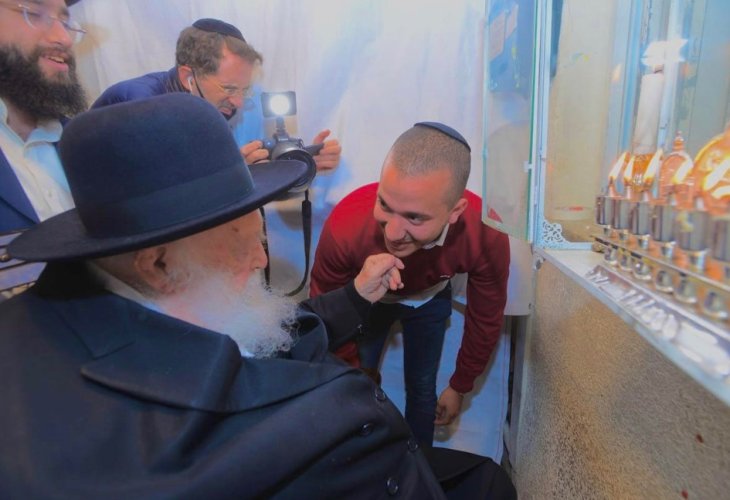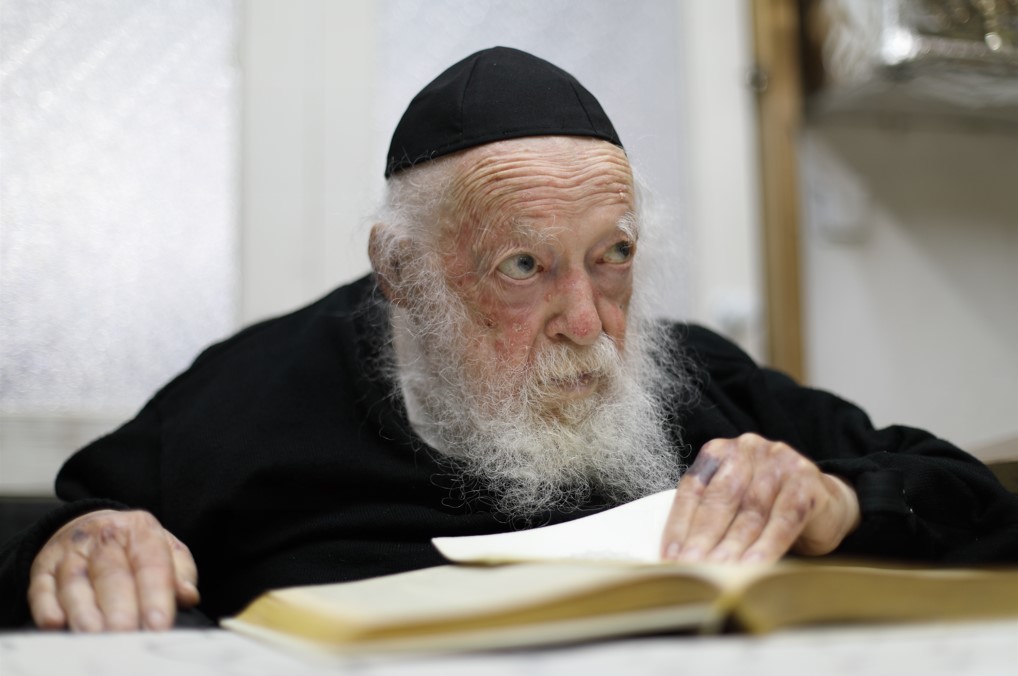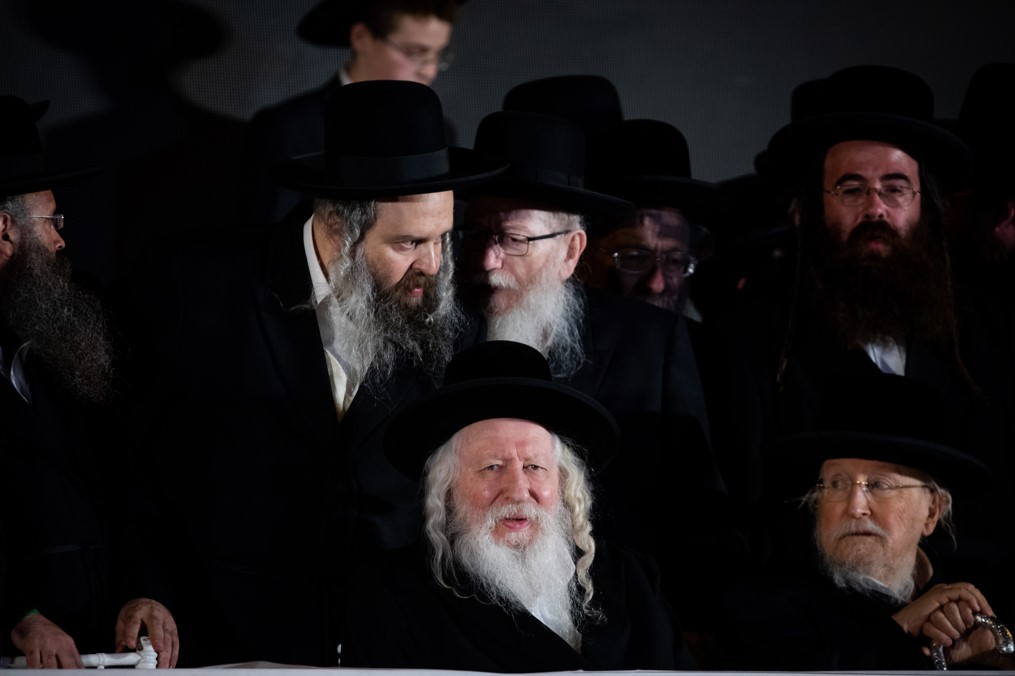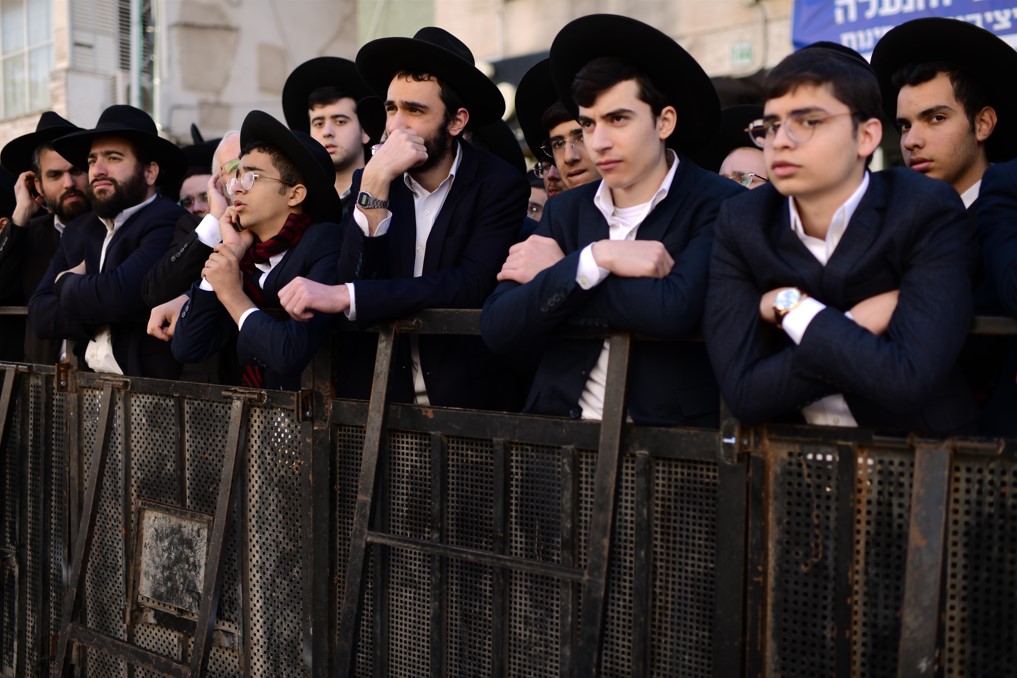The Secrets Behind Securing the Great Rabbis of Israel: A Fascinating Interview with Security Officer Adir Ma'atu
From city inspector to the 'protector of great rabbis' at mass events, Adir Ma'atu shares his experiences working with prominent rabbis like Rabbi Chaim Kanievsky and the miraculous events he's witnessed.
 Photo: Courtesy of the interviewee
Photo: Courtesy of the intervieweeAdir Ma'atu has become a familiar figure throughout the city of Bnei Brak. He wears two hats: by day, he is a parking inspector, and in his more recognized role, he accompanies prominent rabbis and rebbes as a shadow to ensure their safety and security.
"My daily workplace is the Bnei Brak Municipality," says Ma'atu, 31. "In my municipal work, I'm involved in enforcement, and in addition, I work in securing rabbis and, in contrast, other famous personalities."
Ma'atu, who is a graduate of an elite military unit (whose name he cannot disclose), integrated into security work for well-known figures after his military discharge. At some point, he was called to the home of Maran Rabbi Chaim Kanievsky, of blessed memory, to secure the residence and even the rabbi himself during large gatherings. "For years, I was almost like a family member in Rabbi Kanievsky's home," he recalls with longing. "This led to me becoming a recognized figure in rabbi security. Over the years, I've had the opportunity to secure rabbis and rebbes from various communities and factions such as Rabbi Edelstein, the Belz Rebbe, the Vizhnitz Rebbe, Rabbi Povarsky, and the Rishon LeZion, Rabbi Yitzchak Yosef. In all these cases, those requesting my security services were often the family members or gabbaim."
A Miracle at Rabbi Kanievsky's Home
Why are you called to secure the great rabbis?
Although Ma'atu is not Haredi, he is familiar with every detail and nuance of the Haredi community, a testament to his many years working in Bnei Brak. To our question, he replies as one well-acquainted with the segment: "The rabbis I secure are well-known in the public and are opinion leaders, alongside their greatness in Torah and mitzvot. Therefore, sometimes there are those who do not like their rulings, and from the fringes of society, problematic incidents can occur because of this.
"For instance," Ma'atu elaborates, "not everyone agreed with Rabbi Kanievsky's call to vaccinate against COVID-19 to save lives, and there were individuals who wanted to harm the elderly rabbi because of it." Ma'atu is referring to an event that shook the Jewish world after a young man, aged around 25, armed with a knife, arrived at Rabbi Kanievsky's home on Rashbam Street, allegedly to receive a blessing. The man aroused suspicion among the rabbi's household, and they summoned the municipal police. Ma'atu arrived on the scene and assisted in capturing the attacker.
 (Photo: Yaakov Nahumi / Flash 90)
(Photo: Yaakov Nahumi / Flash 90)But protecting rabbis also has another aspect, as he explains: "We protect the rabbi also from community members and the public close to the rabbi and hear his blessings. Here, it's not out of malicious intent but quite the opposite – from the public who want a blessing and wish to get close to the rabbi to hear his instructions and advice. However, it must be understood that rabbis are often elderly, and some use various aids, and the public, in their desire to meet the rabbi or see him up close, can unintentionally cause crowding that might harm him. Another aspect of security concerns the effort made to get the rabbi home as quickly as possible, as their time is extremely valuable and precise. Security plays a crucial role in these three parameters around the rabbi," he notes.
How is this actually done?
"It's important to note there are cases where I work as a team with other security personnel. In instances where I'm alone, I leverage the skills I have from the army, and I'm also a sturdy guy, but what's more important is the communication I have with the public. I simply talk to the crowd and do it in ways that allow me to enlist the participants for the purpose I want to promote, in a way that they'll be with me and not against me."
Ma'atu often uses special techniques he learned in the army, most of which he prefers not to detail. However, he agreed to reveal a few to us: "In general, in some cases, we operate using methods based on deception and evasion, often entering rabbis into crowded areas as discreetly as possible. A notable example of such behavior was with Rabbi Kanievsky, who was very admired by the crowd, and the security around him operated on a level comparable to the Shin Bet.
"There were many instances when the rabbi arrived at halls and conventions, for which an artificial tunnel was built adjacent to the structure, concealing the rabbi's vehicle entrance to the vicinity. I and other security personnel stood around, and the rabbi was taken via secret paths to the place of honor on the stage – otherwise, he would have struggled to reach the platform. We also assist Rabbi Gershon Edelstein, may he live a long life, with similar means." According to Ma'atu, part of the security effort is to deceive the public deliberately and out of necessity. "We tell people the rabbi has already left – while he is still inside, and this is due to necessity – to permit the rabbi's safe exit from the place."
"In the end," says Ma'atu, "my task is to accompany the rabbi so that he returns home safely and as quickly as possible since rabbis want to return to Torah study swiftly, and the importance they see in utilizing time is very evident in our work with them."
How much do you utilize your familiarity with the Haredi public in rabbi protection?
"I roam around Bnei Brak daily and know the Haredi public very well. I know all the different courts and communities, so I know in advance what event I'm attending and can anticipate in advance where there will be more pressure and when to prepare better. In Hasidic communities, where the organizational system is very efficient, I know I can enlist the help of the gabbai, and if he steps out and says something in the name of the rebbe, the public will instantly comply and help me pass the event much more calmly."
Gratitude from the Gur Rebbe
Is there a difference between rabbis you secure and securing individuals who are not Torah giants?
"Certainly," he replies without hesitation. "In securing Israeli rabbis, it's hard not to notice their exceptional character traits. There were rare cases where rabbis were painfully struck due to the crowding, and besides me, no one knew about it because they continued smiling at the public without making anyone feel guilty about the incident, despite their elderly age which undoubtedly added to their pains. Generally, rabbis treat the public with great patience, warmth, and humility. We had cases where we walked with great rabbis, and there was no choice but to push, and the rabbi, who himself was pushed due to the crowding, would comment that we should not push because of him... To me, that is greatness.
 The Gur Rebbe (Photo: Yonatan Sindel / Flash 90)
The Gur Rebbe (Photo: Yonatan Sindel / Flash 90)"As someone who also works with the general public," Ma'atu continues, "I have managed to compile an organized security doctrine, and I clearly see the difference between rabbis and Torah giants compared to regular individuals. I particularly remember an instance when I accompanied the Gur Rebbe's vehicle after a circumcision. I made sure to clear a path for the vehicle so the rebbe could progress safely among the crowds. To my surprise, in the middle of the drive, the rebbe opened the door and called me over just to thank me for the escort. In fact, with every rabbi and rebbe I get to secure, I feel appreciated for my work, and if it doesn't happen immediately, it will come later, during a tish or another opportunity."
According to Ma'atu, another difference he observes between his other securees – and significantly – the great leaders of the generation, is the cross-sectional respect they receive. "When I secure someone who is great in Torah, I see how people of all kinds and types respect him; they're thrilled by his presence and want to be close. When I walked alongside Rabbi Kanievsky, everyone wanted to be near him – Hasidim and Lithuanians, Ashkenazim and Sephardim, traditionalists, secular, and Haredi alike. The same happened when I walked beside Rabbi Yitzchak Yosef, may he live a long life.
"But when I walked alongside just regular celebrities – only those identifying with their genre and style were excited, while other people reacted indifferently. In fact, even some of the celebs I escorted came to Rabbi Kanievsky's home, like my friend, singer Itai Levy, who met the rabbi. I saw there that no matter how famous or how many fans you have, at the rabbi's home, everyone 'melts' due to his greatness."
Were there any preconceptions that vanished?
"I came to Bnei Brak from nearby Pardes Katz," Ma'atu returns to the beginning of his work in Bnei Brak, "and only after some time did I truly start to get to know the Haredi public. Before coming to Bnei Brak, I mainly knew about the Haredim from biased media reports," he admits.
 (Photo: Tomer Neuberg / Flash 90)
(Photo: Tomer Neuberg / Flash 90)Amidst the current wave of incitement against the Haredi community in the media and studios, Ma'atu notes: "Until then, I only knew what was broadcast about the Haredi public from outside, that they were supposedly – God forbid – parasites, don't work, behave wrongly as if, and even exclude women. Only when I came to Bnei Brak did I discover how these narratives have no basis in reality.
"In Bnei Brak, I discovered that most Haredim work, I learned about their welcoming demeanor towards everyone and the special respect they have for women. So many media-reported falsehoods revealed themselves to be absolute 'fake'. The disparity between the media portrayal and the reality is particularly evident now, during the period I stood at roadblocks in the city at the height of the Corona pandemic, and those who came to offer me drinks and food were Haredi people. No one compelled them to do this, and they could have easily ignored it, but they chose to pamper me and the other staff enforcing the regulations. Where else can you see such behavior besides Bnei Brak?!
"Today, through my familiarity with the Haredim, I see their 'derech eretz,' their volunteerism, and the many acts of kindness that occur daily in front of me. As someone who is not from the Haredi community and works in Bnei Brak, I see how they treat others, even if they're not one of their own. One day, I visited the offices of the 'Ezer Mizion' charity organization. Only a few who came to borrow equipment and receive help were Haredi; most were secular. They came from Herzliya and other cities across the country, and at the counter waited young Haredis who assisted them with kind hospitality. As someone who wandered in Rabbi Kanievsky's house and currently visits Rabbi Edelstein's home, I see how rabbis greet everyone with a warm welcome: Haredi, soldiers, Ashkenazi, Sephardi, observant and non-observant. Personally, the positive attitude towards me is also notable, despite not being Haredi, making me feel very much at home in Bnei Brak."
As someone close to the great rabbis of Israel, do you recall an event that left a mark on you?
"I witnessed a miracle right before my eyes. It happened with a close friend who repeatedly tried to have a child without success, and doctors warned the husband that if the wife gave birth without a cesarean, she might die. I brought my friend to Rabbi Kanievsky, and the rabbi asked how he separates the Shabbat with wine. When he heard it was with grape juice, the rabbi instructed him to switch to *wine*. He followed the rabbi's advice. He strengthened his faith, and despite the doctors' warnings, they decided to have a child. Naturally, the woman was very apprehensive, but I was privileged to attend the brit where Rabbi Kanievsky was the sandak of the newborn less than a year later."

